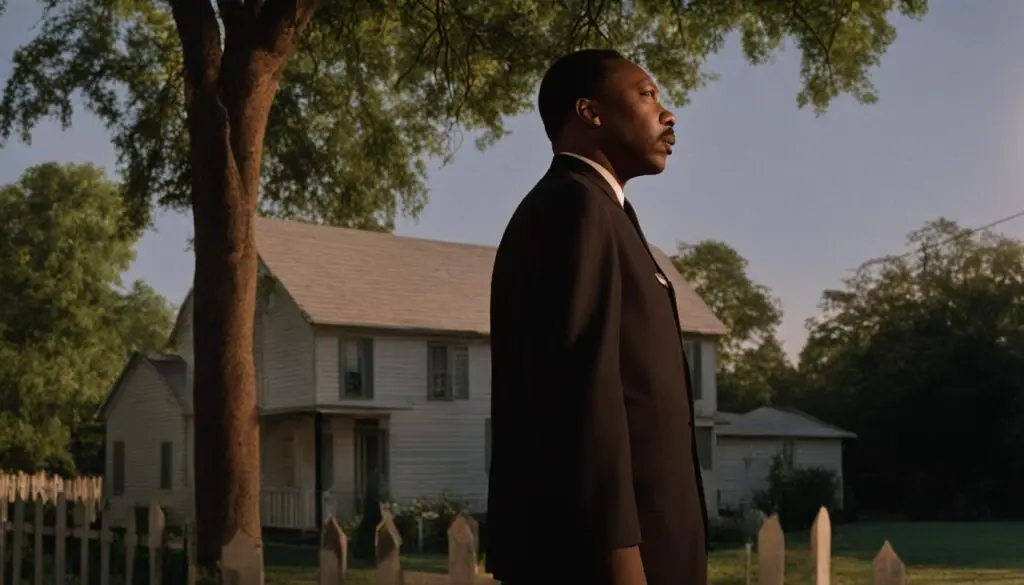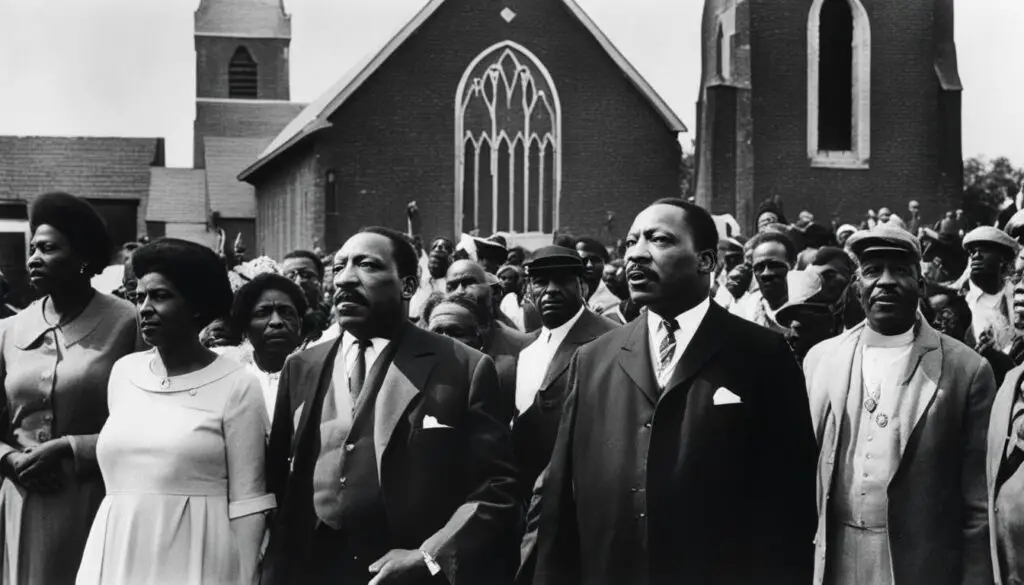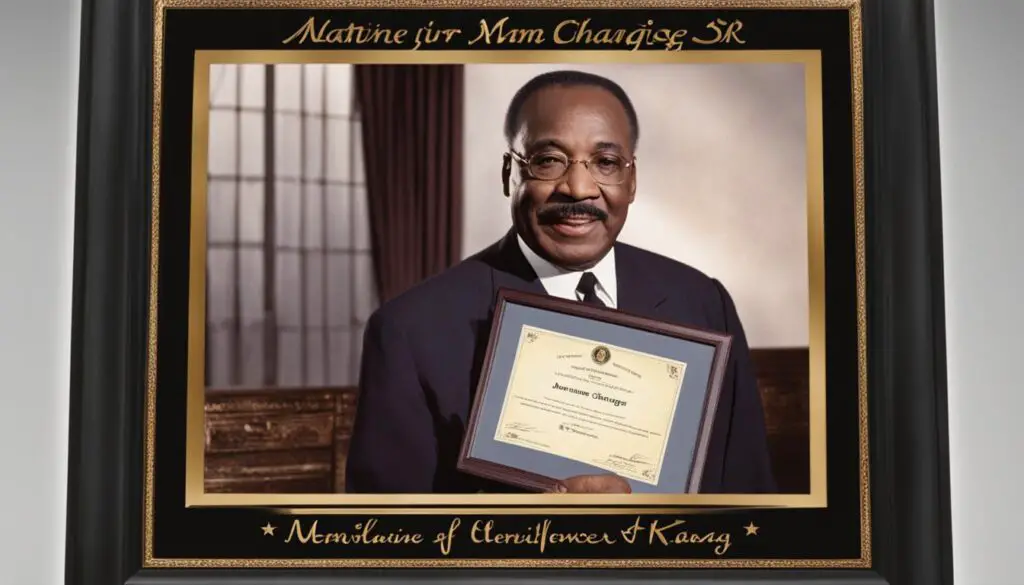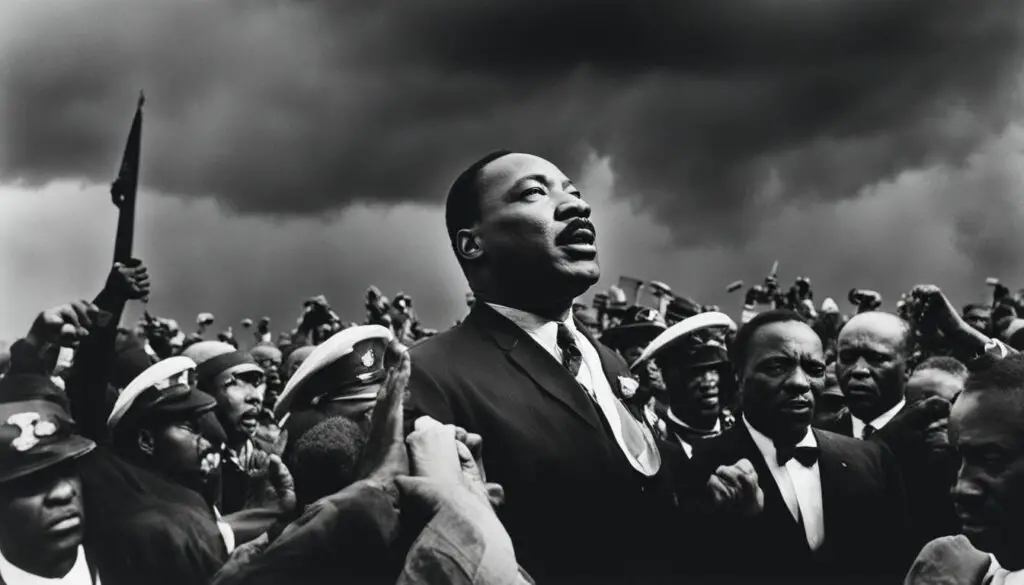Rev. Dr. Martin Luther King Sr., also known as Martin Luther King Sr. or MLK Sr., played a pivotal role in shaping the legacy of the Civil Rights Movement. Born into poverty in 1897, he witnessed firsthand the racial injustices and discrimination faced by African Americans in the rural South. Inspired by his mother’s faith and the few black preachers who spoke out against injustice, he developed deep spirituality and became a minister. He dedicated his life to fighting for equality, serving as a civil rights leader, and advocating for the rights of African Americans. His unwavering commitment to justice, faith, and equality continues to inspire and guide future generations in the pursuit of a more just and inclusive society.
Key Takeaways:
- Martin Luther King Sr. played a crucial role in shaping the legacy of the Civil Rights Movement.
- He dedicated his life to fighting for equality and advocating for the rights of African Americans.
- His unwavering commitment to justice, faith, and equality continues to inspire future generations.
- Martin Luther King Sr.’s legacy serves as a reminder of the ongoing work needed to achieve a more just and inclusive society.
- His example teaches us the power of compassion, faith, and perseverance in the face of adversity.
Early Years and Family Background
In the early years of Martin Luther King Sr., then known as Michael Luther King, he experienced the realities of racial discrimination and economic exploitation as a sharecropper’s son in Stockbridge, Georgia. Growing up in a large family of ten children, he witnessed the challenges faced by African Americans in the rural South during the early 20th century.
Despite the hardships, King found solace and inspiration in the Black church. It was within the walls of these sacred spaces that he discovered the power of faith and witnessed black preachers speaking out against racial injustices. These experiences deeply influenced his values and principles, laying the foundation for his future activism and leadership in the Civil Rights Movement.

My whole being was like a rudderless ship driven by the winds of aimlessness. I was no longer willing to accept the one-sided, paternalistic attitude of white ‘society’ toward Negroes in the South. So I moved from being a passive acquiescent nobody to being an active agitator, a dedicated challenger of the government, a fighter for truth and justice. – Martin Luther King Sr.
The early years and family background of Martin Luther King Sr. served as a catalyst for his lifelong dedication to fighting for equality and justice. These formative experiences within the Black church and his sharecropper upbringing shaped his identity and compelled him to become an influential civil rights leader in his own right, paving the way for the transformative work of his son, Dr. Martin Luther King Jr.
Fortifying the Black Church and Community Institutions
Martin Luther King Sr. was a dedicated activist who understood the importance of fortifying the Black church and community institutions in the fight for civil rights. He recognized that these institutions not only provided spiritual guidance but also served as pillars of strength and resilience for the African American community.
As a civil rights leader, King Sr. actively participated in various initiatives to strengthen the Black church and community institutions. He emphasized the need for education and played a significant role in advocating for equitable teacher salaries for African American educators. His involvement extended beyond the church walls as he served on the boards of important educational institutions, ensuring that the African American community had access to quality education.
“The church is the cornerstone of our community, and we must invest in its growth and empowerment. By strengthening our churches and community institutions, we can equip future leaders and advocate for justice and equality.” – Martin Luther King Sr.
King Sr. understood that by empowering the Black community at its core, meaningful change could be fostered. His activism within the Black church and community institutions laid a strong foundation for the progress of the Civil Rights Movement, inspiring generations to come.

Key Actions and Impact
King Sr. was instrumental in rallying support and resources for the Civil Rights Movement. Through his leadership, he encouraged collective action and unity within the Black community, ensuring that their voices were heard and their rights protected. His tireless efforts helped pave the way for important civil rights legislation and further advanced the cause of equality.
By fortifying the Black church and community institutions, King Sr. created spaces that were not only centers of worship, but also hubs of social activism and empowerment. These institutions became beacons of hope and resilience, providing guidance and support for those fighting against racial injustice.
King Sr.’s activism within the Black church and community institutions not only had a significant impact on the Civil Rights Movement but also inspired future generations to continue the fight for justice and equality. His legacy serves as a reminder of the power of grassroots organizing and community building in effecting lasting change.
Becoming Martin Luther King Sr.
After being deeply inspired by the reformation leader Martin Luther during a trip to Germany, Michael Luther King changed his name to Martin Luther King Sr. upon returning to Atlanta in 1934. This name change reflected his commitment to the ideals of equality, justice, and religious freedom – principles that Martin Luther stood for. Martin Luther King Sr. followed in the footsteps of his father-in-law, becoming the senior pastor of Ebenezer Baptist Church in Atlanta. He continued to advocate for civil rights and social justice while serving as a leader and model for the next generation of civil rights activists.

“I changed my own name from Michael to Martin Luther King Jr. and also my father’s name from Michael King to Martin Luther King Sr.”
Under the mentorship and guidance of his father-in-law, Martin Luther King Sr. played a pivotal role in the growth and development of Ebenezer Baptist Church. He utilized his platform as a preacher to advocate for civil rights, delivering sermons that addressed the social, economic, and political challenges facing African Americans. His involvement in the church community also extended beyond his role as a pastor, as he actively worked to enhance the education, economic opportunities, and social standing of African Americans through various initiatives and partnerships. Martin Luther King Sr.’s leadership at Ebenezer Baptist Church marked the beginning of a long and enduring legacy of activism in his family.
The Influence of Family:
Family played a significant role in shaping Martin Luther King Sr.’s commitment to social justice and equality. Growing up in a sharecropper family in the segregated South, he witnessed firsthand the struggles and injustices faced by African Americans. This upbringing instilled in him a deep sense of empathy and a desire to fight for a better future. The support and encouragement he received from his wife, Alberta Williams King, and their three children, Christine, Alfred, and Martin Luther King Jr., further fueled his activism. The collective efforts of the King family helped bring attention to the civil rights movement and inspire future generations to continue the fight for justice and equality.
| Key Achievements | Impact on Society |
|---|---|
| Named senior pastor of Ebenezer Baptist Church | Increased participation and engagement of African Americans in the church community |
| Advocated for civil rights and equality | Inspired and mentored future civil rights leaders, including his son, Martin Luther King Jr. |
| Strengthened the Black church and community institutions | Provided a platform for African Americans to address social and political issues |
| Played a significant role in the early stages of social reform | Contributed to the progress of the Civil Rights Movement |
Challenges Faced and Overcoming Adversity
Martin Luther King Sr. encountered numerous challenges throughout his life as he fought against racial violence and economic exploitation. Growing up in the rural South, he witnessed the devastating effects of racial discrimination, including lynchings that targeted the Black community. These experiences fueled his determination to seek justice and equality for African Americans.
In addition to the external challenges posed by racial violence, King Sr. also faced personal adversity within his own family. He witnessed his father’s struggles with alcohol addiction and domestic abuse, which further strengthened his resolve to overcome adversity and create a better future for future generations.
“The ultimate measure of a man is not where he stands in moments of comfort and convenience, but where he stands at times of challenge and controversy.” – Martin Luther King Sr.
Despite the trials he faced, Martin Luther King Sr. drew strength from his faith and the Black church. He believed in the power of love and nonviolence to combat the injustices faced by African Americans. By relying on his core values and his unwavering spirit, he overcame the challenges before him and became a beacon of hope for those who sought equality and justice.

Lessons from Overcoming Adversity
- Perseverance: King Sr.’s journey teaches us the importance of persevering in the face of challenges. Despite the obstacles he encountered, he remained steadfast in his commitment to fighting for justice.
- Faith: King Sr.’s unwavering faith served as a source of strength and resilience. It reminded him of the power of love and nonviolence and gave him the courage to continue his fight.
- Hope: King Sr.’s ability to overcome adversity offers hope to individuals facing their own challenges. It serves as a reminder that change is possible and that the pursuit of justice and equality is worth fighting for.
Through his resilience, determination, and unwavering faith, Martin Luther King Sr. overcame significant challenges. His journey serves as an inspiration, reminding us that even in the face of adversity, we have the power to effect change and create a more just and equitable society.
| Challenges Faced | Lessons Learned |
|---|---|
| Racial violence | Perseverance |
| Economic exploitation | Faith |
| Personal adversity | Hope |
Key Achievements and Impact on Society
Martin Luther King Sr. made significant achievements during his lifetime, leaving a lasting impact on civil rights and society as a whole. His dedication to fighting for equality and justice paved the way for monumental changes and inspired future generations to continue the struggle for a more equitable society.
As a civil rights leader, King Sr. played a critical role in the early stages of social reform. He served on the boards of important educational and religious institutions, advocating for equal rights and opportunities for African Americans. His tireless efforts led to advancements such as salary increases for African American teachers, which not only improved their livelihoods but also contributed to the empowerment of the Black community.
King Sr.’s influence went beyond his activism. As a respected pastor and community leader, he instilled a sense of hope and resilience among African Americans, encouraging them to stand up against racial discrimination and systemic oppression. His dedication to the Black church and community institutions laid the foundation for future leaders and activists, shaping the progress of the Civil Rights Movement.

In addition to his direct impact on civil rights, King Sr.’s legacy continues to inspire and guide individuals today. His core values of justice, equality, and faith serve as a reminder of the importance of using one’s voice to challenge injustice and work towards a more inclusive society. His unwavering commitment to nonviolence and his emphasis on love and compassion as powerful tools for social change resonate deeply with those striving for a better world.
Through his achievements and the example he set, Martin Luther King Sr. demonstrated the profound impact one individual can have on society. His legacy serves as a call to action, pushing us to continue the fight for civil rights and to create a better future for all.
Core Values and Principles
The core values and principles of Martin Luther King Sr. were deeply rooted in his faith, commitment to justice, and unwavering pursuit of civil rights. Drawing inspiration from his upbringing in the Black church and the teachings of love and nonviolence, King Sr. dedicated his life to fighting for equality and social justice.
Emphasizing the importance of justice and equality, King Sr. believed in the transformative power of peaceful protest and nonviolent resistance. He firmly believed that change could be achieved through love and understanding, rather than through hatred and violence.
King Sr.’s core values also encompassed a strong sense of community and a commitment to uplifting others. He recognized the importance of building strong institutions within the Black community, such as the Black church and educational organizations, to foster empowerment and advocate for equal rights.
“Injustice anywhere is a threat to justice everywhere.” – Martin Luther King Sr.
Through his activism and leadership, King Sr. left a lasting impact on society. His unwavering commitment to justice and equality continues to inspire individuals and communities around the world. His legacy serves as a reminder of the power of compassion, faith, and the pursuit of civil rights in creating a more just and inclusive society.
The Legacy of Martin Luther King Sr.
The legacy of Martin Luther King Sr., a prominent civil rights leader, continues to inspire and shape our society today. His unwavering dedication to justice and equality has left a lasting impact on the fight for civil rights and has served as an inspiration to countless individuals striving for a more just and inclusive world.
Martin Luther King Sr.’s key achievements in the civil rights movement are a testament to his commitment and influence. As a leader and father, he played a crucial role in laying the foundation for future civil rights activists, most notably his son, Dr. Martin Luther King Jr. His involvement in fortifying the Black church and community institutions provided essential support and guidance to those fighting for their rights.
Overcoming numerous challenges, Martin Luther King Sr. persevered in the face of racial violence and economic exploitation. His resilience and determination serve as a source of inspiration, demonstrating the power of faith and the ability to create lasting change through nonviolent means.
Martin Luther King Sr.’s core values and principles, including justice, equality, and faith, continue to guide and inspire us. His legacy reminds us of the importance of standing up against injustice and fighting for a more equitable society. Through his influence and activism, he paved the way for future generations to continue the pursuit of civil rights, leaving behind a powerful and enduring legacy that serves as a beacon of hope and inspiration for all.
Learning from Martin Luther King Sr.’s Example
The life and work of Martin Luther King Sr. serve as a powerful example of unwavering dedication to justice, equality, and civil rights. His relentless pursuit of a better world, anchored by his commitment to nonviolence and guided by his deep faith, continues to inspire individuals and communities worldwide. Martin Luther King Sr.’s legacy teaches us valuable lessons that transcend time, reminding us of the importance of using our voice to challenge injustice, even in the face of overwhelming adversity.
One of the key lessons we can learn from Martin Luther King Sr.’s example is the power of perseverance. Despite facing numerous challenges and obstacles, he remained steadfast in his pursuit of equality and justice. His unwavering commitment to the cause inspired others to join the fight for civil rights and challenged the deeply ingrained systems of discrimination and inequality.
“There comes a time when one must take a position that is neither safe, nor politic, nor popular, but he must take it because conscience tells him it is right.” – Martin Luther King Sr.
Another important lesson we can learn from Martin Luther King Sr. is the impact that individuals can have on society. As a leader and advocate for civil rights, he played a significant role in shaping the course of history. His work within the Black church and community institutions laid the foundation for future leaders and activists, including his son, Dr. Martin Luther King Jr. His influence and dedication continue to inspire generations, emphasizing the importance of each individual’s ability to effect meaningful change.
Inspired by Martin Luther King Sr., we are reminded of our obligation to challenge injustice, to speak up for those whose voices have been silenced, and to strive for a society that is truly equal and just. His example teaches us that change is possible, even in the face of seemingly insurmountable odds, and that by standing up for what is right, we can create a better world for future generations.
Recognizing the Impact of Reverend Dr. Martin Luther King Sr.
Reverend Dr. Martin Luther King Sr., the father of the iconic civil rights leader Dr. Martin Luther King Jr., made a significant and often overlooked impact on the Civil Rights Movement. Known for his unwavering commitment to justice, equality, and faith, he laid the foundation for future leaders and activists.
“When you are right, stand fast, even if you have to stand alone.”
Despite facing numerous challenges, Reverend Dr. Martin Luther King Sr. remained steadfast in his pursuit of equality. He witnessed the racial violence, economic exploitation, and discrimination faced by African Americans in the South. Inspired by his upbringing in the Black church and his mother’s faith, he dedicated his life to advocating for civil rights and fighting against injustice.
Reverend Dr. Martin Luther King Sr.’s legacy extends beyond his role as a father and community leader. His achievements in civil rights activism, including his involvement in local church organizations and his efforts to raise teacher salaries for African American educators, had a profound impact on society. His dedication to justice and equality continues to inspire and guide individuals and communities in their pursuit of a more just and inclusive society.
In recognizing the impact of Reverend Dr. Martin Luther King Sr., we honor his contributions to the Civil Rights Movement and acknowledge the lasting legacy he has left behind. His example teaches us the power of faith, perseverance, and standing up against injustice. Let us draw inspiration from his unwavering commitment to justice and equality as we work toward a more inclusive and equitable society for all.
Celebrating the Legacy of Martin Luther King Sr.
Martin Luther King Sr.’s legacy is a constant reminder of his significant contributions to the civil rights movement and his unwavering commitment to justice and equality. His tireless efforts in advocating for civil rights and his influence as a leader and father continue to inspire and shape society today. Through various events and commemorations, his remarkable legacy is celebrated and honored, reaffirming the importance of his work.
One such notable event is the annual Martin Luther King Jr. Day, where communities come together to commemorate the achievements and principles of both Martin Luther King Sr. and his son, Dr. Martin Luther King Jr. This day serves as a powerful reminder of their unwavering dedication to the advancement of civil rights and the ongoing fight for equality.
“Injustice anywhere is a threat to justice everywhere.”
-Martin Luther King Jr.
| Event | Details |
|---|---|
| Martin Luther King Jr. Day Parade | A vibrant parade celebrating the legacy of Martin Luther King Sr. and Jr. with marching bands, decorated floats, and community involvement. |
| Memorial Services | Special services held at churches and community centers to pay homage to Martin Luther King Sr.’s contributions and to reflect on the ongoing struggle for civil rights. |
| Guest Lectures and Panel Discussions | Renowned speakers and experts are invited to discuss the impact of Martin Luther King Sr.’s legacy, shedding light on the civil rights movement and inspiring individuals to continue the fight for social justice. |
These celebrations not only commemorate the extraordinary life of Martin Luther King Sr., but also serve as a call to action, motivating individuals to carry forward his vision of a more just and equal society. His legacy lives on, urging us to recognize the power of collective action and the importance of standing up against injustice.
Conclusion
Martin Luther King Sr.’s impact and legacy as a leader, father, and civil rights activist are profound and enduring. Throughout his life, he exemplified an unwavering commitment to justice, faith, and equality, inspiring individuals and communities to rise up against injustice and strive for a more inclusive and equal society.
His remarkable example teaches us the power of compassion, faith, and perseverance in the face of adversity. As we honor his legacy, we are reminded of the ongoing work that still needs to be done to ensure equality and justice for all. Martin Luther King Sr. laid the foundation for the Civil Rights Movement and his influence continues to shape the progress towards a more just and inclusive America.
Martin Luther King Sr.’s core values and principles, rooted in his faith and the teachings of the Black church, guided his activism and leadership. He believed in the inherent dignity and worth of every human being, and he fought tirelessly for the rights of African Americans and all marginalized communities. His legacy serves as a reminder that justice and equality are not achieved overnight, but rather through the collective efforts of passionate individuals who refuse to remain silent in the face of injustice.
We can learn valuable lessons from Martin Luther King Sr.’s example. His legacy inspires us to use our voices to speak out against injustice, to advocate for the rights of the oppressed, and to work towards a society that embraces diversity and equality. His tireless dedication to creating positive change reminds us that each of us has the power to make a difference, no matter how small our contribution may seem.
FAQ
Who is Rev. Dr. Martin Luther King Sr.?
Rev. Dr. Martin Luther King Sr., also known as Martin Luther King Sr. or MLK Sr., was a civil rights leader and the father of Dr. Martin Luther King Jr. He played a crucial role in shaping the legacy of the Civil Rights Movement.
What were Martin Luther King Sr.’s early years and family background?
Martin Luther King Sr., born as Michael Luther King, grew up as a sharecropper’s son in Stockbridge, Georgia. He witnessed the racial discrimination and economic exploitation faced by African Americans and found inspiration in the Black church.
How did Martin Luther King Sr. fortify the Black church and community institutions?
Martin Luther King Sr. actively participated in strengthening the Black church and community institutions. He recognized the importance of building a foundation within the Black community to advocate for civil rights and shape future leaders.
Why did Michael Luther King change his name to Martin Luther King Sr.?
After being inspired by the reformation leader Martin Luther, Michael Luther King changed his name to Martin Luther King Sr. This name change reflected his commitment to equality, justice, and religious freedom.
What challenges did Martin Luther King Sr. face?
Martin Luther King Sr. faced challenges such as witnessing racial violence, economic exploitation, and racial discrimination. He also experienced personal adversity within his own family, but he found strength in his faith and used his experiences to inform his activism.
What were Martin Luther King Sr.’s key achievements and impact on society?
Martin Luther King Sr. achieved significant milestones in civil rights advocacy. He served on educational and religious institution boards, advocated for teacher salary increases, and played a crucial role in the early stages of social reform. His influence continues to inspire generations.
What were Martin Luther King Sr.’s core values and principles?
Martin Luther King Sr. was guided by a strong set of core values and principles, including justice, equality, and faith. His upbringing in the Black church instilled in him a deep spirituality and a belief in the power of love and nonviolence to combat racial injustices.
What is the legacy of Martin Luther King Sr.?
Martin Luther King Sr. left behind a powerful and enduring legacy through his contributions to the Civil Rights Movement and his influence as a leader and father. His commitment to justice and equality continues to inspire individuals and shape progress towards a more just society.
What can we learn from Martin Luther King Sr.’s example?
Martin Luther King Sr.’s example teaches us the importance of using our voice and standing up against injustice, even in the face of adversity. He reminds us of the power of faith, compassion, and perseverance in creating lasting change.
What is the impact of Reverend Dr. Martin Luther King Sr.?
Reverend Dr. Martin Luther King Sr. had a significant impact on the Civil Rights Movement and the pursuit of justice and equality. His activism, leadership, and influence continue to inspire individuals and communities in their fight for civil rights.
How is the legacy of Martin Luther King Sr. celebrated?
The legacy of Martin Luther King Sr. is celebrated and honored through various events and commemorations. Holidays like Martin Luther King Jr. Day and community events highlight his contributions to the Civil Rights Movement and inspire continued activism for justice and equality.
What is the conclusion of Martin Luther King Sr.’s legacy?
The legacy of Martin Luther King Sr., with its focus on justice, equality, and faith, serves as a reminder of the ongoing work needed to ensure a just and inclusive society. His life and example continue to inspire individuals and communities in the pursuit of equality and social justice.
